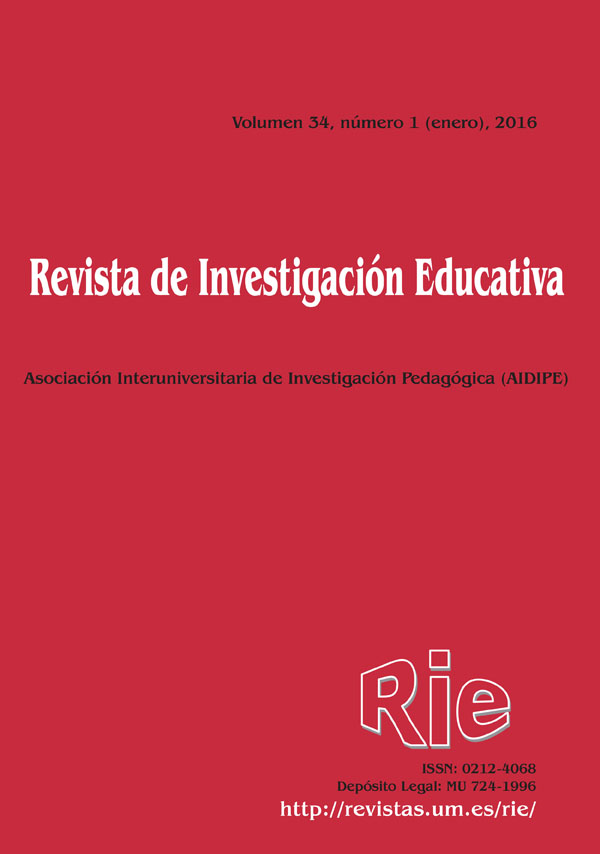¿Quo vadis, evaluación? Reflexiones pedagógicas en torno a un tema tan manido como relevante
Resumen
En este artículo se presentan una serie de reflexiones sobre la evaluación desde perspectivas radicalmente pedagógicas en las que el autor pretende analizar las implicaciones que una determinada concepción de la misma, concretada en unos principios básicos, representan para un buen hacer al servicio de la calidad de la educación. El autor defiende un enfoque unitario, armónico y coherente de la evaluación del aprendizaje y de la enseñanza, de los programas y de los centros educativos, extensible a otras manifestaciones como pueden ser los currículos universitarios y los sistemas educativos, aunque estos últimos tengan otro tipo de implicaciones que aquí no corresponde abordar.
Descargas
-
Resumen1643
-
PDF1299
Citas
Bloom, B.S. Hasting, J.Th. y Madaus, G.F. (1981). Evaluación del aprendizaje. Buenos Aires: Troquel.
Bonboir, A. (1976). La docimología. Problemática de la evaluación. Madrid: Morata.
Comité Conjunto de Estándares para la Evaluación Educativa (1998). Estándares para la evaluación de programas. Bilbao: Ediciones Mensajero.
De la Orden Hoz, A. y González Soler, A. (1982). Análisis de las pruebas finales de EGB. Revista Española de Pedagogía, 156, 7-40.
De la Orden Hoz, A. (1988). La calidad de los centros educativos, asunto para un congreso. Bordón, 40(2), 149-162.
Edmons, R. (1982). Programs of Schools Improvement: An Overview. Educational Leadership, 40(3), 4-11.
Escudero Escorza, T. (1980). ¿Se pueden evaluar los centros educativos y sus profesores? I.C.E. de la Universidad de Zaragoza: Zaragoza.
Garín, J. y otros (2009). Estadios organizativos y gestión del conocimiento en instituciones educativas. Revista de Ciencias Sociales, 15(4), 620-634.
Gento Palacios, S. (1994). La gestión de calidad en Educación. Madrid: La Muralla.
Id. (1998). Implantación de la calidad total en las instituciones educativas. Madrid: UNED. Hills, J.R. (1982). Evaluación y medición en la Escuela. México: Kapelusz Mexicana.
Joint Committée on Standards for Educational Evaluation (1994). The Program Evaluation Standards. Berverly Hills: Sage Pub.
Luján, J. y Puente, J. (1996). Evaluación de Centros docentes. El plan EVA. Madrid: MEC.
Ministerio de Educación y Ciencia (varios años). Sistema Estatal de Indicadores de la Educación. http://www.mecd.gob.es/inee/sistema-indicadores.html
Ministerio de Educación y Ciencia. Instituto de Evaluación. (2015). PISA 2015 Programa para la Evaluación Internacional de Alumnos de la OCDE. Informe Español. Madrid: Autor. http://www.mecd.gob.es/inee/estudios/pisa.html
Nevo, D. (1986). The Conceptualization of Educational Evaluation. En E. R. House (Edit.), New Directions in Educational Evaluation (pp.15-30). Lewes: Falmer Press.
Page, E.B. (1958). A seventy-four classroom experiment in school motivation. Journal of Educational Psychology, 49, 173-181.
Pérez Juste, R. y García Ramos, J.M. (1989). Diagnóstico, evaluación y toma de decisiones. Madrid: Rialp.
Pérez Juste, R. (1996). La evaluación en la Universidad. En V. García Hoz (Dir.) La Educación personalizada en la Universidad: Tratado de Educación Personalizada (Vol. 27, pp. 431-478). Madrid: Rialp.
Pérez Juste, R. (2006). Evaluación de Programas Educativos. Madrid: La Muralla.
Pérez Juste, R. (2007). Quality Education: Educational Personalization and Social Pertinence. En J.E. Benton y P. Swami: Creating Cultures of Peace. Pedagogical Thounght and Practice (pp. 29-44). San Diego (EEUU): World Council for Curriculum and Instruction.
Pérez Juste, R. (Coord.) (2012). El Portfolio. Aprendizaje, competencias y evaluación. Madrid: UNED.
Sammons, P., Hillman, J. y Mortimore, P. (1995). Key characteristics of effective schools: a review of school effectiveness research. London: OFSED and Institute of Education.
Scheerens, J. (1992). Effective Schooling Research. Theory and Practice. Londres: Casell.
UNESCO (1998). Declaración Mundial sobre la Educación Superior en el siglo XXI: Visión y Acción. UNESCO. http://www.unesco.org/education/educprog/wche/declaration_spa.htm.
Yarbrough, D.B. y otros (2011). Las normas de evaluación de programas: Una guía para los evaluadores y los usuarios de la evaluación (3ª Ed.). Thousand Oaks, CA: Sage.
Las obras que se publican en esta revista están sujetas a los siguientes términos:
1. El Servicio de Publicaciones de la Universidad de Murcia (la editorial) conserva los derechos patrimoniales (copyright) de las obras publicadas, y favorece y permite la reutilización de las mismas bajo la licencia de uso indicada en el punto 2.
2. Las obras se publican en la edición electrónica de la revista bajo una licencia Creative Commons Reconocimiento-NoComercial-SinObraDerivada 3.0 España (texto legal). Se pueden copiar, usar, difundir, transmitir y exponer públicamente, siempre que: i) se cite la autoría y la fuente original de su publicación (revista, editorial y URL de la obra); ii) no se usen para fines comerciales; iii) se mencione la existencia y especificaciones de esta licencia de uso.
3. Condiciones de auto-archivo. Se permite a los/as autores/as a difundir electrónicamente las versiones pre-print (versión antes de ser evaluada) y/o post-print (versión evaluada y aceptada para su publicación) de sus obras antes de su publicación, ya que favorece su circulación y difusión más temprana y con ello un posible aumento en su citación y alcance entre la comunidad académica.










